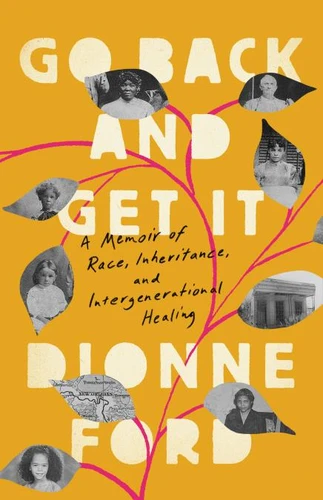Go Back and Get It. A Memoir of Race, Inheritance, and Intergenerational Healing
Par :Formats :
Disponible dans votre compte client Decitre ou Furet du Nord dès validation de votre commande. Le format ePub protégé est :
- Compatible avec une lecture sur My Vivlio (smartphone, tablette, ordinateur)
- Compatible avec une lecture sur liseuses Vivlio
- Pour les liseuses autres que Vivlio, vous devez utiliser le logiciel Adobe Digital Edition. Non compatible avec la lecture sur les liseuses Kindle, Remarkable et Sony
- Non compatible avec un achat hors France métropolitaine
 , qui est-ce ?
, qui est-ce ?Notre partenaire de plateforme de lecture numérique où vous retrouverez l'ensemble de vos ebooks gratuitement
Pour en savoir plus sur nos ebooks, consultez notre aide en ligne ici
- Nombre de pages256
- FormatePub
- ISBN978-1-64503-015-7
- EAN9781645030157
- Date de parution03/04/2023
- Protection num.Adobe DRM
- Infos supplémentairesepub
- ÉditeurBold Type Books
Résumé
An unexpected family photograph leads Dionne Ford to uncover the stories of her enslaved female ancestors, reclaim their power, and begin to heal Countless Black Americans descended from slavery are related to the enslavers who bought and sold their ancestors. Among them is Dionne Ford, whose great grandmother was the last of six children born to a Louisiana cotton broker and the enslaved woman he received as a wedding gift. What shapes does this kind of intergenerational trauma take? In these pages, which move between her inner life and deep research, Ford tells us.
It manifests as alcoholism and post-traumatic stress; it finds echoes in her own experience of sexual abuse at the hands of a relative, and in the ways in which she builds her own interracial family. To heal, Ford tries a wide range of therapies, lifestyle changes, and recovery meetings. "Anything, " she writes, "to keep from going back there." But what she learns is that she needs to go back there, to return to her female ancestors, and unearth what she can about them to start to feel whole.
It manifests as alcoholism and post-traumatic stress; it finds echoes in her own experience of sexual abuse at the hands of a relative, and in the ways in which she builds her own interracial family. To heal, Ford tries a wide range of therapies, lifestyle changes, and recovery meetings. "Anything, " she writes, "to keep from going back there." But what she learns is that she needs to go back there, to return to her female ancestors, and unearth what she can about them to start to feel whole.
An unexpected family photograph leads Dionne Ford to uncover the stories of her enslaved female ancestors, reclaim their power, and begin to heal Countless Black Americans descended from slavery are related to the enslavers who bought and sold their ancestors. Among them is Dionne Ford, whose great grandmother was the last of six children born to a Louisiana cotton broker and the enslaved woman he received as a wedding gift. What shapes does this kind of intergenerational trauma take? In these pages, which move between her inner life and deep research, Ford tells us.
It manifests as alcoholism and post-traumatic stress; it finds echoes in her own experience of sexual abuse at the hands of a relative, and in the ways in which she builds her own interracial family. To heal, Ford tries a wide range of therapies, lifestyle changes, and recovery meetings. "Anything, " she writes, "to keep from going back there." But what she learns is that she needs to go back there, to return to her female ancestors, and unearth what she can about them to start to feel whole.
It manifests as alcoholism and post-traumatic stress; it finds echoes in her own experience of sexual abuse at the hands of a relative, and in the ways in which she builds her own interracial family. To heal, Ford tries a wide range of therapies, lifestyle changes, and recovery meetings. "Anything, " she writes, "to keep from going back there." But what she learns is that she needs to go back there, to return to her female ancestors, and unearth what she can about them to start to feel whole.



